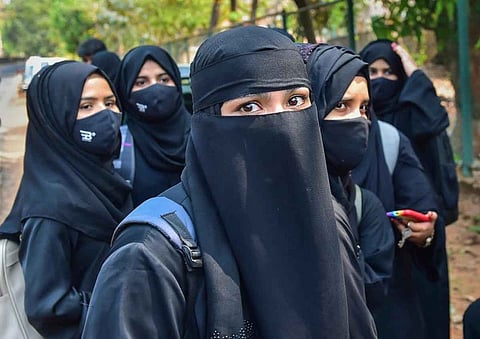
Story- Ritwik Dutta
It was 10.30 am the morning of Thursday, 13th of October 2022 when the two bench judges Hemant Gupta and Sudhanshu Dhulia passed a split verdict on the controversial Hijab Ban- that stormed different parts of Karnataka earlier this year. Both the judges expressed different opinions in the judgment leading to a split verdict against the ban on religious clothing in educational spaces.
What is the Hijab Ban?
A clear reflection of domination across all spaces to impose Hindu beliefs across the state by the ruling government.
Several laws and policies are being amended by the government for building a Hindu nation trampling religious freedom with force.
The Hijab ban was another crushing decision pushed down the throat of religious minorities.
The row began in December 2021 in the Udupi District of Karnataka when 6 Muslim girls were not allowed to enter school wearing Hijab. The incident stoked the fire and spread to other parts of the state.
The rising flame of religious differences fanned across the educational institutions of Karnataka. Soon, many other colleges followed suit and banned any kind of religious clothing and termed hijab as regressive. The court passed an interim stay order on religious clothing in classrooms.
It was seen as a violation of an individual's choice to decide on what they are supposed to wear and what not. A lot of the recent judgments have been about policymakers failing to protect an individual's freedom of choice and expression.
The arguments given by different lawmakers stating their support towards a verdict have been about progressiveness, but undoubtedly at the expense of a direct attack on a particular community.
Where are the legal rights? Where do we see ourselves in the context of a constitution built on the foundation of freedom of expression and freedom of choice?
Muslim woman lawyer HassanaQuadri who is pursuing her PhD states that " I would still be aware of my rights as a Muslim woman, even without the law degree as there are many rights given to me by my religion as well- which are being taken away from me. It's not only about expression but also about the right to wear what I want- it's just a piece of cloth anyway".
In a secular country like India, religion should be a very private matter but they are watching the progress from the same(religious) lens. Additionally, there is violence committed in many parts of the country in the name of religion and we are taking away the basic rights of several Muslim women who would not be allowed by their conservative families to pursue education because of the ban on hijab. Education is a part of the change and not clothing. We cannot negotiate at this point of time on the education of any woman."
She also mentions how as a woman, she has been prohibited to choose for herself and it is somewhere about patriarchy. She also adds, " I also believe we all carry in one way or the other. It's not about only clothing but also as a Muslim woman it has some emotional dimension to it. I am given to work maybe because I do not carry hijab but for every other woman who does, it would be so difficult for them to work or pursue education. What about their religious identities they always carried?"
In a country where the hunger index has been breaking records for the worse; Isn't it a time when we need to build more educational systems, rather than depriving a particular community of education systematically on the basis of what they wear?
The verdict
While Justice Hemant Gupta opined that the hijab is not a necessary form of asserting one's religion and upheld the Karnataka high court order ,itwas contradicted by justice Sudhanshu Dhulia, who proclaimed that wearing a hijab was a matter of choice.
With the verdict reaching a deadlock, it is expected to drag on for an inordinately long period of time.
Educational institutions and protection of rights
Educational institutions are always believed to advocate for the rights of minorities; be it gender, caste, class or religion.
Amazingly, the pattern of the last few verdicts by the Supreme Court of India on the protection of minorities had negative connotations and failed to evaluate judgments based on the sufferer's perspective.
One needs to understand the nature of several verdicts which explicitly exude the influence of government on independent bodies.
To ensure a democratic approach towards opinions, experiences, diversity and freedom of choice there is a serious need to focus on approaches that don't deny or withhold the right to live.
As a country, the question to ponder is to get back the potential in achieving freedom without compromising on someone's dignity.
Disclaimer: The views expressed in this article are the personal views of the author. The Mooknayak is not responsible for the accuracy, integrity, practicability, and completeness of any information contained in this article. All the information in this article has been presented as it is. None of the information or facts or views expressed in this article are those of The Mooknayak, and The Mooknayak is not responsible for them in any way.
You can also join our WhatsApp group to get premium and selected news of The Mooknayak on WhatsApp. Click here to join the WhatsApp group.